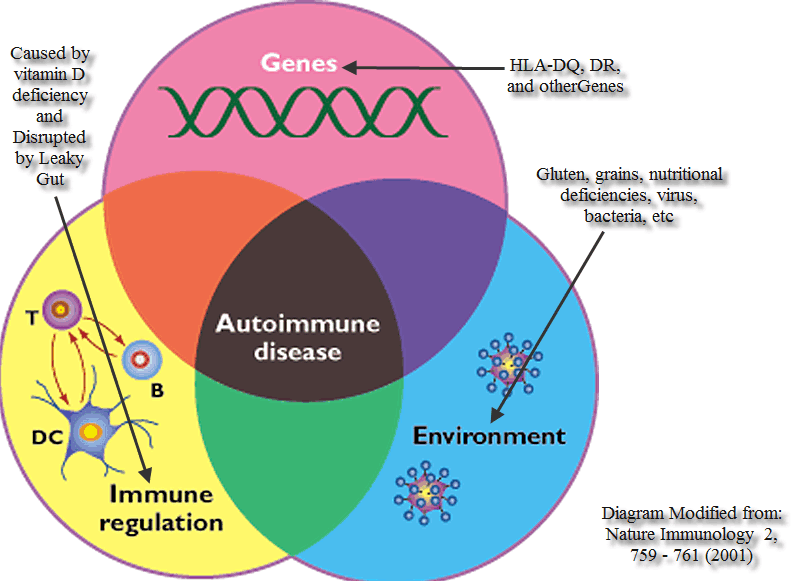 If you have been diagnosed with any form of autoimmune disease, you need to read this and consider a gluten free diet immediately.
If you have been diagnosed with any form of autoimmune disease, you need to read this and consider a gluten free diet immediately.
New Research Links Gluten Sensitivity to Multiple Autoimmune Diseases
Dr. Osborne
Glutenfreesociety.org
Research continues to link the autoimmune spectrum of diseases to gluten sensitivity. In a recent study, gluten intolerance was found to be present in patients with multiple types of autoimmune conditions:
“Results of our studies revealed in the group of 110 patients with diagnosed gluten enteropathy, coexistence of autoimmune disease, such as diabetes mellitus type 1 in 7.2% cases, hyperthyreosis on 1.8% of cases, vitiligo in 0.9% of cases, primary biliary cirrhosis in 2% of cases and rheumatoidal arthritis in 0,9 of cases. In the group of 80 ulcerative colitis patients, coexistence of celiac disease basing on serological histopatological investigation was found in 4 patients (5%).”
A previous post on Gluten Free Society showed the connection between gluten induced liver disease (autoimmune hepatitis). Now another new study points more autoimmune disease overlap in patients with autoimmune hepatitis.
“A total of 111 patients (40%) were diagnosed with additional autoimmune diseases…autoimmune thyroiditis was the most common concurrent disease (28 patients, 10%). Other concurrent autoimmune diseases comprised vitiligo (5 patients), rheumatoid arthritis (5 patients), Sjogren syndrome (4 patients), ulcerative colitis (4 patients), conjunctivitis (4 patients), celiac disease (3 patients), systemic lupus erythematodes (2 patients), type I diabetes (2 patients), multiple sclerosis (2 patients), polymyalgia rheumatica (2 patients), and urticaria (2 patients). One patient each was diagnosed with Crohn’s disease, autoimmune gastritis, collagenous colitis, hypophysitis, and sarcoidosis.”
Sources
J Clin Gastroenterol. 2010 Jan 15. [Epub ahead of print]
Przegl Lek. 2009;66(7):370-2.

Gluten Free Society’s Stance:
Although we have identified a number of environmental and genetic triggers for autoimmunity, the only known cause for any autoimmune disease in gluten. When will doctors quit trying to micro analyze autoimmune diseases and look at the obvious connections?
Many autoimmune disease symptoms are so similar that the only way to differentiate them is by running specific antibody tests. The problem with this is that the tests can sometimes be negative and sometimes be positive. A common example of this is between rheumatoid arthritis and lupus. For most patients two simple lab tests will determine which diagnosis is given (positive RF and ANA antibodies for lupus).
Treatment for most autoimmune conditions consists of steroids, DMARDS, and other anti-inflammatories. Do doctors ever consider where the inflammation is coming from?
Why is it so hard to accept that simple dietary changes can improve disease and health? The answer is simple. Nutrition is not taught in medical school. Most doctors devalue or dismiss nutrition because they don’t understand it. Unfortunately this translates into more drugs, less real health care solutions, and sicker people.
Autoimmune diseases collectively are the number 1 disease condition in the U.S. As the American diet becomes more and more processed, so too does autoimmune disease increase. It is time to look at food a little more seriously. As we have linked gluten sensitivity as a cause of celiac disease, we should turn our sites to food with the other autoimmune disease as well. To ignore this is folly.
As the wise Thomas Edison put it:
“The doctor of the future will give no medication, but will interest his patients in the care of the human frame, diet and in the cause and prevention of disease.”
Dr. Foley Comments:
It’s very important to understand the connection between hidden gluten sensitivity and early signs of autoimmune disease. Gluten-related problems have been increasing, and now affect at least 7 percent of the population, or 21 million Americans. Unfortunately, 99 percent of people who have problems with gluten or wheat are NOT currently diagnosed. Most doctors dismiss gluten sensitivity if you don’t have a diagnosis of Celiac disease, but new research proves them wrong. People can be gluten-sensitive without having Celiac disease (or gluten antibodies) and still have inflammation and symptoms of autoimmune disease. This is becoming increasingly prevalent in our children today.
At BodyCures, we scan all body systems for the presence of gluten and other food toxins. In the event that gluten is present, specific whole food enzymes are often necessary to precisely target and eliminate any gluten residue from certain organs, tissues and glands. The key to good health is to cleanse any toxic build-up from the body before it becomes a problem and causes disease.
